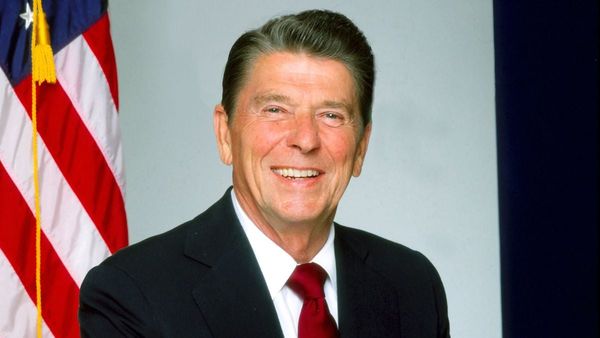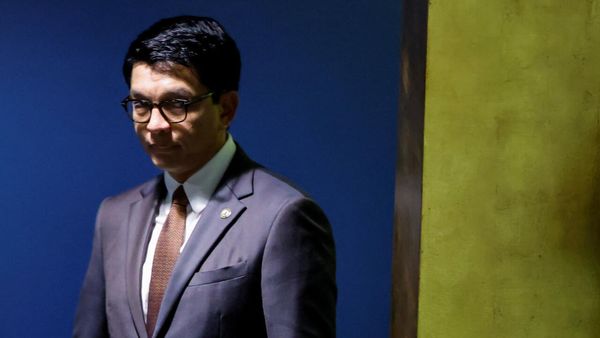
It is a grey morning in Shadwell, east London. But inside the old shell of Tobacco Dock, the gloom gives way to pulsating neon lights, flashy cars and cryptocurrency chatter.
Evangelists for Web3, a vision for the next era of the internet, have descended on the old trading dock to network for two days. For many, the main event is one man: Nigel Farage.
“Whether you like me or don’t like me is irrelevant, I’m actually a champion for this space,” the leader of Reform UK tells the audience of largely male crypto fanatics at the Zebu Live conference.
“Either I’m here to support your community, or your community is here to support me. But either way, this is a trade that works for both of us.”
It is a transactional relationship that Farage is trying to nurture, aping Donald Trump’s playbook in the hope that it could grow into a funding base for his next election campaign. This year Reform became the first main party in the UK to accept donations through bitcoin and other cryptocurrencies.
Farage is now hitting the circuit, attenders at the conference say. A week ago he appeared at the Digital Assets Summit, about a mile away at Old Billingsgate.
“I want to bring digital assets and crypto in from the cold in London,” he told the Zebu event.
“I realised after being debanked, [cryptocurrency] is the ultimate freedom: being in control securely of your own money, making your own decisions, free from authoritarian government. Crypto is the ultimate freedom of the 21st century and debanking absolutely taught me that for life.”
It is an idea that strikes a chord with the libertarian streak among crypto fans, who value the digital currencies for their anonymity and independence from traditional finance.
Many of them became even more anti-establishment following Farage’s dispute with NatWest after the bank closed his accounts – and they are cheering the Reform leader on, tweeting selfies as he speaks.
It helps that Farage’s hustler shtick is tailor-made for crypto: he insists he would have been a crypto trader in the 1980s, and says he likes to dabble.
His message also seems to chime with many young entrepreneurs in the audience, who advocate an anonymised internet that permeates every aspect of life while allowing them to get rich quick.
The flashier the better, it seems: at the entrance to the conference a black Rolls-Royce Wraith convertible advertises CryptoAutos, a platform that allows people to buy or rent cars with cryptocurrency.
Day 2 @Zebu_live 🎯 @CryptoAutos $AUTOS pic.twitter.com/1MAJ6Nny0a
— Waqs (@cryptowaxworks) October 22, 2025
The conference is decked out with new tech, freebies and toys. In one corner, Sam Altman’s startup Worldcoin displays its silver orbs, inviting passersby to have their eyeballs scanned as part of a project to use biometric verification to distinguish humans from AI systems.
It starts off deceptively quietly. A panel on how to manage crypto taxation, “HMRC and the Ledger of Secrets”, attracts no more than 40 people in a room that could easily seat 200. It is only in the afternoon, when Farage’s keynote speech nears, that the event begins to liven up.
“I don’t like him,” says one attender. “But if he can make people’s daily lives in this industry easier then people will want to listen to what he has to say … even if they may not agree with his politics.”
Farage is the only major political leader in the UK who has made his stance on cryptocurrency clear – and, in a move that would probably win over much of this crowd in east London, has said he would introduce a bill to cut capital gains tax on crypto assets from 24% to 10%.
Keir Starmer’s government has said it wants the UK to become a leader in the tokenisation of securities, though the prime minister himself has not been vocal on the topic. Nor has Kemi Badenoch, the leader of the Conservatives. For Farage, this small but well-funded group of crypto fans could be ripe for the taking.
But there are grumblings of discontent about his cosying up to the sector. Simon Jones, an investor in the open finance startup Baanx, pulled out of the event after Farage’s attendance was announced, saying the conference had turned into a “political festival”.
“I don’t think he should have been invited,” Jones said. “He’s just there on a campaign platform, even though it is an industry event and there is no real scrutiny of him.
“He is taking out of Donald Trump’s playbook and enacting it here. Trump went pro in this sector and raised a lot of money.”
The US president has raised millions in political donations from cryptocurrency billionaires alongside other big tech companies, and his family’s crypto ventures have soared in value, boosting the Trumps’ fortunes.
But in the UK, crypto donations are falling under more scrutiny amid worries they could obscure the sources of party funding and open the door to hostile foreign actors.
Liam Byrne, the Labour MP for Birmingham Hodge Hill and chair of the business and trade parliamentary committee, has argued that crypto donations could corrupt British politics.
Meanwhile at the Centre for Finance and Security (CFS) and the Royal United Services Institute (Rusi), academics have launched a study on the possible democratic, security and transparency risk posed by these donations.
But as the conference crowd spills into the nightclub on the other side of the road for the after-party, many seem unfazed that they could hold the key to Farage’s route to power.
“Nigel Farage is one of the only politicians that likes crypto,” says one conference-goer. “It’s smart for him to be here. If crypto people like him, then there’s a lot he can get.”
The best public interest journalism relies on first-hand accounts from people in the know.
If you have something to share on this subject you can contact the Business team confidentially using the following methods.
Secure Messaging in the Guardian app
The Guardian app has a tool to send tips about stories. Messages are end to end encrypted and concealed within the routine activity that every Guardian mobile app performs. This prevents an observer from knowing that you are communicating with us at all, let alone what is being said.
If you don't already have the Guardian app, download it (iOS/Android) and go to the menu. Scroll down and click on Secure Messaging. When asked who you wish to contact please select the Guardian Business team.
SecureDrop, instant messengers, email, telephone and post
If you can safely use the tor network without being observed or monitored you can send messages and documents to the Guardian via our SecureDrop platform.
Finally, our guide at theguardian.com/tips lists several ways to contact us securely, and discusses the pros and cons of each.







